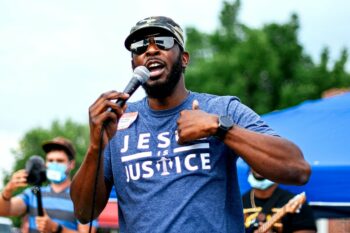
By Michael Ashcraft —
Jonathan Tremain “JT” Thomas is a chaos chaser.
He showed up in Ferguson, Missouri after Michael Brown’s death at the hands of police in 2014 to fight for equal treatment for people of color — but also to help quell the rising violence of protests that were being hijacked by non-local agitators.
“In church circles, there’s been this desire for awakening,” JT says on Slate. “Oh my goodness, it looks like awakening has come to America in the form of chaos.”
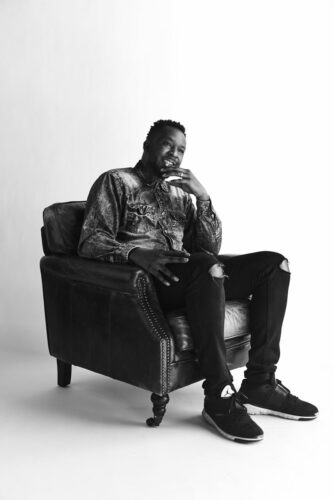 Chasing chaos is JT’s full-time job, and his organization, the pun-derived nonprofit “Civil Righteousness” — has been part of the healing balm applied to a nation convulsed by months of protests, vandalism, riots, looting and anarchy. Christian race-relations expert Dante Stewart calls them “the next generation of the racial reconciliation movement.”
Chasing chaos is JT’s full-time job, and his organization, the pun-derived nonprofit “Civil Righteousness” — has been part of the healing balm applied to a nation convulsed by months of protests, vandalism, riots, looting and anarchy. Christian race-relations expert Dante Stewart calls them “the next generation of the racial reconciliation movement.”
He likes to talk to hot-headed young radicals, to white conservative evangelicals and to angry black liberal progressives in their 50s and 60s and get them all thinking outside of their bubbles. “Jesus came for all,” he says. “There are serious issues in policing that need to be addressed, but also the police officers are human.”
With Methodist circuit-rider great grandparents and a grandmother who was sister of soul legend/ civil rights activist Nina Simone, JT says he’s had a confluence of influences to uniquely prepare him for his current ministry.
Raised in a predominately black Baptist church in North Carolina, he launched on the path to become a missionary in college but zeroed in on urban needs in America. He worked in Tennessee and Indiana but struggled to raise support, so he started a video production company and accepted a teaching pastorate in a nondenominational church in St. Louis.
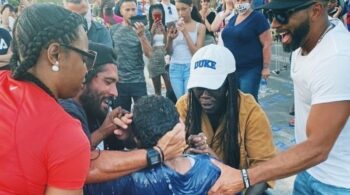
Then Ferguson erupted in unrest that quickly spread across the nation. In a dream vision, JT saw himself type an email titled “Meet me in Ferguson” and took it to mean that he should travel there in the name of the Lord.
He joined prayer groups and observed mounting street protests. He confirmed that agitators from St. Louis were the ones stoking the flames of outrage and sparking violence. After two months of trying to inject God into the equation, he moved his family and set up permanent residence in Ferguson.
When white supremacist Dylann Roof killed nine black Christians at church in Charleston, South Carolina, JT unobtrusively introduced himself on the scene to conduct prayer services and distributed food to the homeless.
After James Alex Fields Jr. slammed his car into Heather Heyer, killing her, and injured 19 others at a white supremacist rally in Virginia in 2017, JT conducted trainings for local churches on “how to be peacemakers and mediators.”
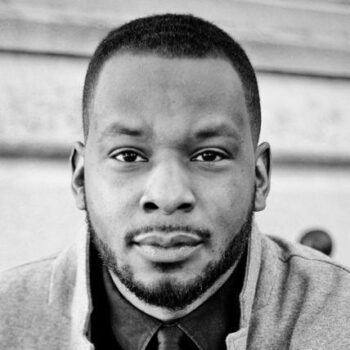 By then, Civil Righteousness had grown into a network of like-minded Christians who are ready to mobilize like a SWAT team. “We live a lifestyle of readiness,” JT says.
By then, Civil Righteousness had grown into a network of like-minded Christians who are ready to mobilize like a SWAT team. “We live a lifestyle of readiness,” JT says.
Naturally, they deployed to Minneapolis.
The protests sparked by George Floyd have been different than any previous. They have become more widespread and more supported by politicians and media. They also have been more dominated by Marxists and Antifa. Leaders of BLM have openly declared the Marxist alignment. Antifas engaged in organized anti-police mobilizations, ambushing cops and using lasers to blind them.
In Seattle, hard left activists seized entire city blocks, which they declared their own. The so-called Capitol Hill Autonomous Zone kicked out cops and city officials and practiced self-governance stylized after the hippies of the 60s but with a strong black power undercurrent until two murders occurred and city officials sent police to restore order.
The BLM/Antifa movement of 2020 has prompted a broad band of liberal politicians to “defund” police and ban the use of force by cops. Minneapolis city council voted to “abolish” their police department and set up a network of social workers to respond to 911 calls.
Crime has spiked in New York after Mayor de Blasio, an avowed socialist, blasted the police union representative for inciting violence. De Blasio himself participated in painting “Black Lives Matter” on the city street in front of Trump Tower, an affront to the man whom they accuse of being racist.
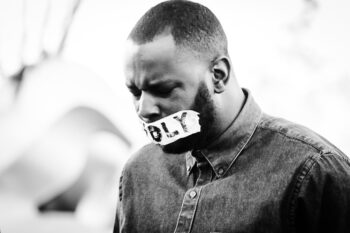 JT understands the rage brought by fear of tens of thousands of African Americans who feel targeted by cops.
JT understands the rage brought by fear of tens of thousands of African Americans who feel targeted by cops.
“When I saw the Floyd video, I was ready to go burn something down. I was angry,” he admits. “But I was like, ‘If I go in my feelings, I am not going to be helpful.’”
In Minneapolis, his group of 20 volunteers assembled a stage for preaching, prayer and worship near the spot where Floyd was killed. They mounted a public gesture of repentance called “the wall, in which they taped over their mouths to stand in silence against “division.”
It has been a contentious four years since Trump took over. The mainstream media has hounded and accused him of all sorts of wickedness. They have overtly advocated murdering Trump. With the Left pushing hard against him, the Right has taken refuge in moving further to the right politically.
JT is all about bridging these divisions. He gets people to talk to each other, and he gets people to looking for solutions in Jesus, not Karl Marx.
“When our teams are there, we have seen the entire atmosphere change,” JT says. “You can’t read the Bible and not see that God calls people to ministry in other places.”
On Saturday, Civil Righteousness organized prayer on Martin Luther King boulevards in 300 cities across America as a “hopeful proclamation.”
“For at least 50 years, protest is the only model we’ve known to provoke action and get attention in the corridors of power, but if we’re going to pursue justice , we have to have righteousness in the corridors of our hearts.”
If you want to know more about a personal relationship with God, go here
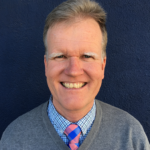 Based in Los Angeles, Michael Ashcraft does Christian journalism, teaches in a Christian school and works as a financial professional.
Based in Los Angeles, Michael Ashcraft does Christian journalism, teaches in a Christian school and works as a financial professional.



